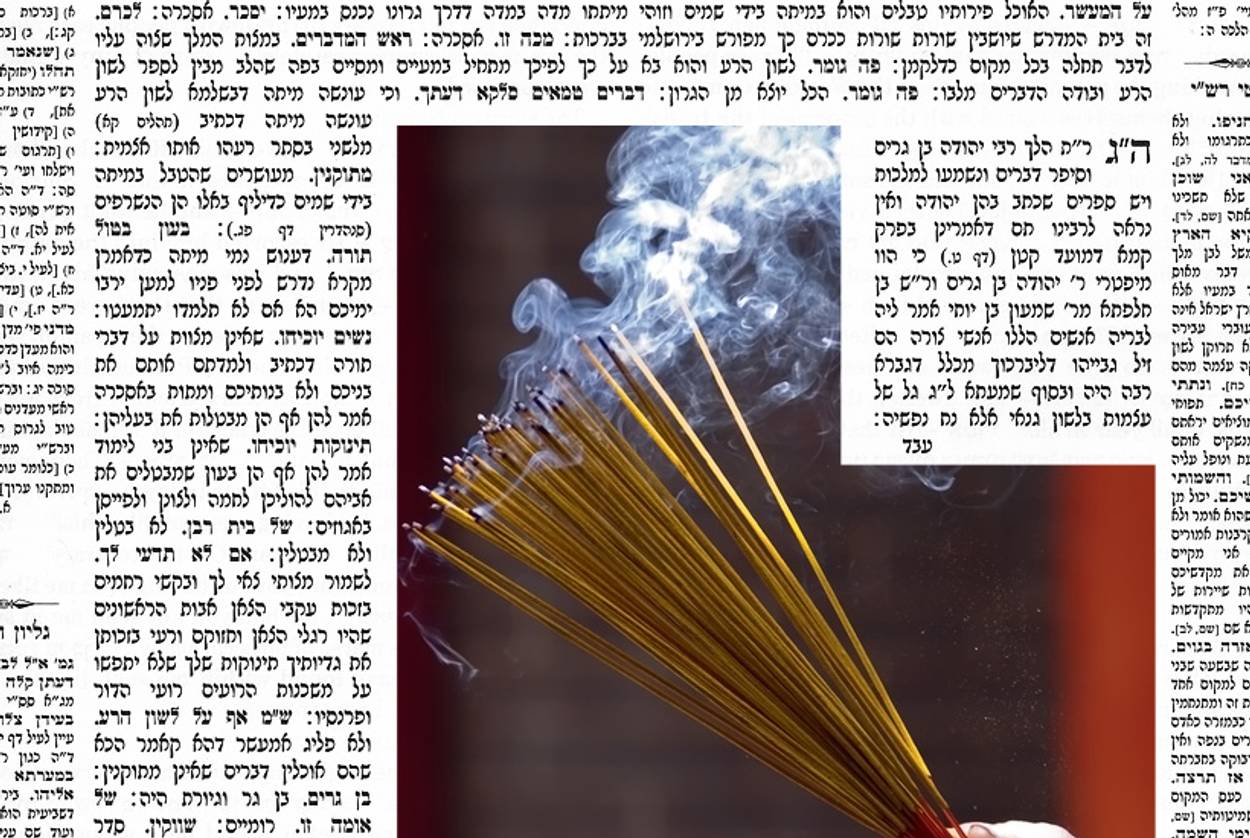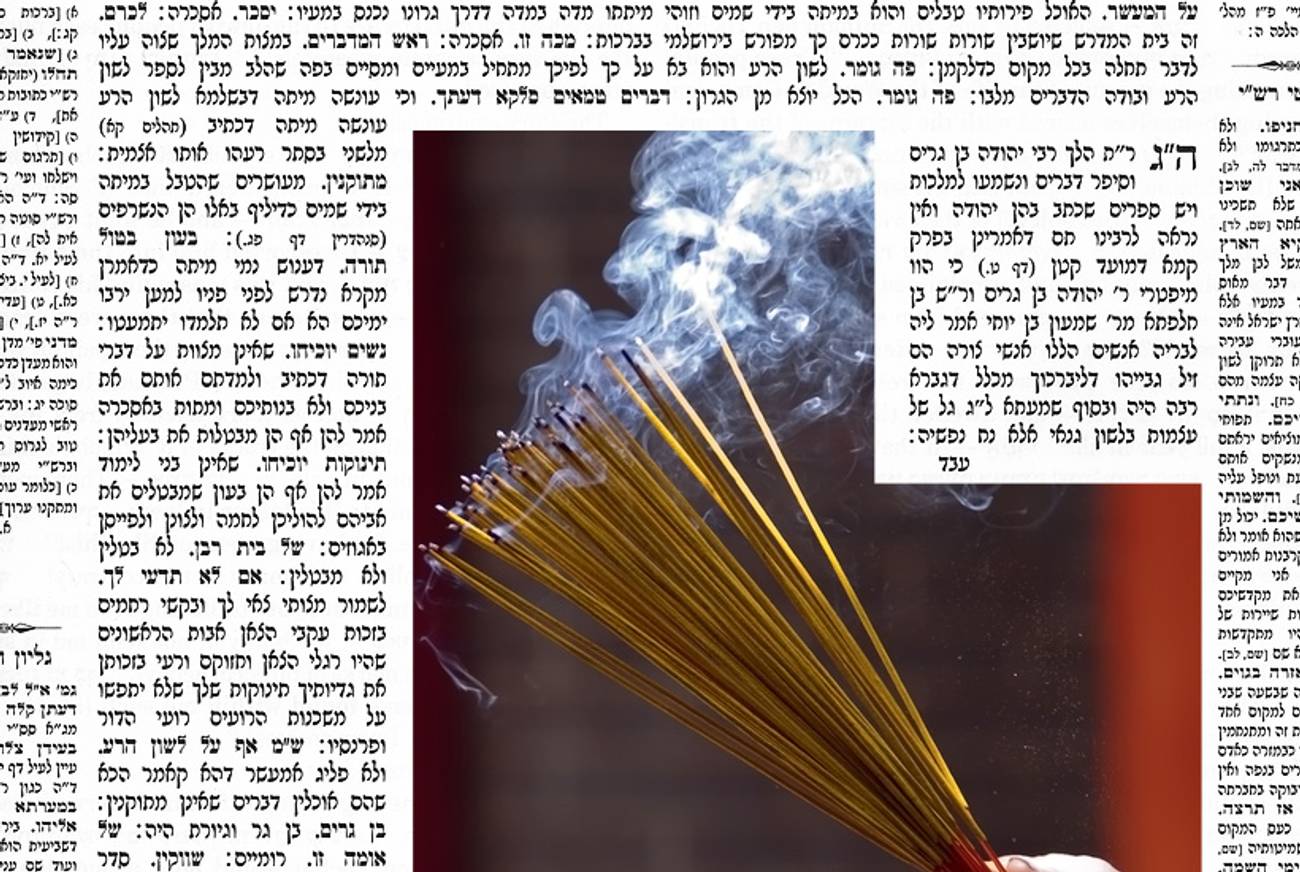In the Talmud, the Fall of a Priestly Upper Class Is Just Deserts
Biblical examples of righteousness and wickedness show that in Judaism, goodness remains possible and divine




Literary criticAdam Kirschis readinga page of Talmud a day, along with Jews around the world.
Last month, in Tractate Shekalim, Daf Yomi readers encountered two priestly families known as the House of Avtinas and the House of Garmu. Each of these clans was the hereditary keeper of one of the Temple rituals: The House of Avtinas was responsible for making the incense burned in the Temple in Jerusalem; and the House of Garmu was in charge of baking the shewbread. In this week’s Daf Yomi reading, in Tractate Yoma, we heard once again about how these families refused to share their recipes, treating them as a kind of trade secret. This irritated the Temple authorities, who tried to bring in craftsmen from Alexandria as replacements; but the replacements proved unable to do things the right way, and the families had to be hired back at twice their old salary.
What should we think of the House of Avtinas—were they greedy and selfish for withholding their incense recipe, or did they have some more respectable motive? In Yoma 38a, the Gemara offers contrasting opinions about this. After the Temple was destroyed, Rabbi Yishmael recounts, he was walking along the road and he came across a descendant of the House of Avtinas. “I said to him: Your fathers sought to enhance their honor and sought to diminish God’s honor.” But now that the Temple was gone and the priestly families had lost their prestigious roles, “The honor of God remains as it was, and he diminished their honor.”
This anecdote suggests, though obliquely, what an enormous upheaval the destruction of the Temple must have created in Judean society. The priestly hierarchy was large and well-established, constituting the upper class of the nation; now they were suddenly rendered useless, like aristocratic émigrés during the French Revolution. There is even a hint of satisfaction in Yishmael’s words. The Talmud makes no secret of the fact that the priests’ ostentation and hunger for prestige sometimes made them unpopular. The fall of the House of Avtinas must have looked to some people like their just deserts.
Here, as often, it is useful to supplement the Talmud’s account of Second Temple-era Jerusalem with the one offered by the historian Josephus in The Jewish War. Josephus was himself a priest, and his sympathies were wholly with the established upper class of first-century Judea. But reading between the lines, it’s possible to see that the great Jewish revolt of 66-70 C.E., which attempted to cast off Roman rule and ended in catastrophe, was in large part a class revolt as well. The priests ruled Jerusalem under Roman authority, and during the war the priesthood was constantly urging the people to reconcile with their Roman overlords. The movement known as the Zealots—radical anti-Roman militants, who occupied the Temple at the beginning of the rebellion—were fighting against not just foreign rule, but priestly collaboration as well. (One of the first acts of the rebels was to burn down the offices containing debt records, a move that surely increased their popularity with the Jewish poor.)
It is typical of the Talmud’s apolitical approach that none of these conflicts are visible in the rabbis’ discussion of the priesthood and the Temple. The unpopularity of the House of Avtinas is attributed simply to their stinginess about the incense recipe, not to any larger economic or political grievance. And even this black mark is wiped away in another story told by Rabbi Yochanan ben Nuri.
One day after the destruction of the Temple, Yochanan relates, he came across an elderly survivor of the House of Avtinas, who handed over a scroll containing the formula for making incense. “As long as the House of my forefathers was extant, they would not pass it on to anyone,” the old man said. But now the chain of transmission was broken, and he had no choice but to entrust it to Yochanan: “Be careful with it,” he begged. Now that they were so humbled, Akiba ruled that their bad reputation had been erased: “It is prohibited to mention them unfavorably.” The episode is like a parable of the way religious authority was handed over, after the Temple’s destruction, from the priests to the rabbis who interpreted Jewish law.
The fall of the House of Avtinas leads the Gemara to reflect on the matter of posthumous reputations. The rabbis mention a man named Ben Kamtzar, who knew a technique for writing with four pens simultaneously but refused to teach it to anyone. “About Ben Kamtzar and his counterparts,” the Gemara quotes a phrase from the book of Proverbs: “But the name of the wicked shall rot.” What this means, the rabbis explain, is that the names of wicked people become unpopular, so that people no longer give them to children—much as no one today would name a child Adolf.
More troubling is the rabbis’ conclusion that certain names are so tainted by wickedness that people who bear them are subject to divine punishment. In I Samuel 22, for instance, we read about one Doeg the Edomite, who carries out an order from King Saul to slaughter a family of priests who were in league with David against him. Doeg’s rampage—he is said to have murdered 85 priests in one day—is a good reason for him to be counted among the wicked whose names will rot.
In Yoma 38b, the rabbis tell about a young boy who lived during the time of the Jewish rebellion, named Doeg ben Yosef. This Doeg was his mother’s favorite: “Each day his mother measured his height in handbreadths and donated gold equivalent to the weight that he gained to the Temple.” When the Romans laid siege to Jerusalem, however, the city fell victim to starvation, and Doeg’s mother ended up killing and eating him. (Josephus, too, reports cases of cannibalism during this terrible period.) Why did this happen to Doeg? The rabbis answer that it was because of his name, which was a wicked name: “See what befell him.”
Did the rabbis really believe that people deserve to die because their names? This seems manifestly unjust, and indeed it seems to have bothered Rabbi Elazar, who quickly revises the rule: “A righteous person is praised for his own actions, and a wicked person is cursed not only for his own actions but also for the actions of his wicked counterpart.” By this logic, a good person with a bad name will not suffer for it, but someone who lives up to the wickedness of his name will receive extra punishment. (Where this leaves poor Doeg ben Yosef, who was just a child, remains unclear.)
As the discussion goes on, the Gemara turns to other biblical examples of righteousness—such as Abraham—and wickedness—such as the people of Sodom and Gomorrah. Rabbi Elazar uses a biblical allusion to support the beautiful idea that “Even for one righteous person the world is created”: After all, when God created the world, he “saw that it was good,” “and good means nothing other than righteous.” Rabbi Yochanan adds that God never allows the world to be completely without righteous people: “No righteous person [tzaddik] departs from this world until another comparable righteous person is created.” Tzaddikim are rare, but God “planted some of them in each and every generation.” This statement seems to be connected to the Jewish folk tradition that there are 36 tzaddikim in each generation, though we might not know exactly who they are.
Toward the end of chapter 3 of Yoma, the Gemara turns to consider a line from Proverbs: “If it concerns the scorners, he scorns them, but to the humble he gives grace.” According to Reish Lakish, this saying is connected with the mystery of sin and free will. God gives us the freedom to sin, and he won’t stop us from doing evil; but if we resolve to do good, he will actively help us. Reish Lakish offers a metaphor: Imagine a merchant who is selling both foul-smelling naphtha and sweet balsam. If a customer comes to purchase naphtha, the merchant will sell it, but he says, “Measure it for yourself”: He doesn’t want to get too close to the bad smell. With balsam, on the other hand, the merchant says, “Wait for me until I can measure it with you, so that you and I will both be perfumed.” As always, the moral realism of the rabbis is impressive: They don’t deny the human propensity to evil, but they insist that goodness remains possible and divine.
***
You can help support Tablet’s unique brand of Jewish journalism.Click here to donate today.
Adam Kirsch is a poet and literary critic, whose books include The People and the Books: 18 Classics of Jewish Literature.
Adam Kirsch is a poet and literary critic, whose books include The People and the Books: 18 Classics of Jewish Literature.